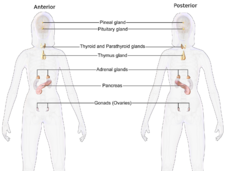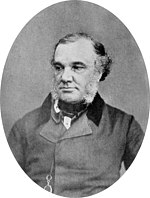Endocrinology/ja: Difference between revisions
Created page with "===仕事=== 内分泌学の診療科では、さまざまな症状や変異の診断的評価と、1つまたは複数のホルモンの欠乏または過剰の疾患の長期的管理を行う。" Tags: Mobile edit Mobile web edit |
Created page with "内分泌疾患の診断と治療は、実験室検査によって、他の専門分野よりも大きな指針を得ることができる。 多くの疾患は、''興奮/刺激''または''抑制/抑制''検査によって調べられる。内分泌臓器の機能を調べるために、刺激剤を注射することもある。その後、血液を採取し、関連するホルモンや代謝産物の変化を評価する。 内分泌専門医は、..." Tags: Mobile edit Mobile web edit |
||
| Line 76: | Line 76: | ||
内分泌学の診療科では、さまざまな症状や変異の診断的評価と、1つまたは複数のホルモンの欠乏または過剰の疾患の長期的管理を行う。 | 内分泌学の診療科では、さまざまな症状や変異の診断的評価と、1つまたは複数のホルモンの欠乏または過剰の疾患の長期的管理を行う。 | ||
内分泌疾患の診断と治療は、[[:en:laboratory|実験室]]検査によって、他の専門分野よりも大きな指針を得ることができる。 | |||
多くの疾患は、''興奮/刺激''または''抑制/抑制''検査によって調べられる。内分泌臓器の機能を調べるために、刺激剤を注射することもある。その後、血液を採取し、関連するホルモンや代謝産物の変化を評価する。 | |||
内分泌専門医は、検査の用途と限界を理解するために、[[clinical chemistry/ja|臨床化学]]と[[biochemistry/ja|生化学]]の幅広い知識を必要とする。 | |||
<div lang="en" dir="ltr" class="mw-content-ltr"> | <div lang="en" dir="ltr" class="mw-content-ltr"> | ||
Revision as of 19:43, 20 February 2024
 女性の主要内分泌器官を描いたイラスト | |
| System | 内分泌 |
|---|---|
| Significant diseases | 糖尿病, Thyroid disease/ja, Androgen excess/ja |
| Significant tests | Thyroid function tests/ja, 血糖値 |
| Specialist | Endocrinologist/ja |
| Glossary | Glossary of medicine/ja |
内分泌学(ないぶんぴがく、endocrinology、内分泌系+-ologyより)は、内分泌系、その疾患、およびホルモンとして知られる特異的な分泌物を扱う生物学および医学の一分野である。また、代謝、成長と発達、組織機能の発達事象の統合、増殖、成長、分化、および心理的または行動的な活動にも関係している、 睡眠、消化、呼吸、排泄、気分、ストレス、授乳、運動、生殖、およびホルモンによって引き起こされる感覚知覚。専門は行動内分泌学と比較内分泌学である。
内分泌系はいくつかの腺から構成され、すべて身体の異なる部位にあり、ホルモンをダクト系ではなく血液に直接分泌する。したがって、内分泌腺はダクトレス腺とみなされる。ホルモンは多くの異なる機能と作用様式を持つ。1つのホルモンが異なる標的臓器に複数の作用を及ぼすこともあれば、逆に1つの標的臓器が複数のホルモンの影響を受けることもある。
内分泌系
内分泌学とは、人体の内分泌系を研究する学問である。これはホルモンを分泌する腺のシステムである。ホルモンは、体内のさまざまな臓器系の作用に影響を及ぼす化学物質である。例えば、甲状腺ホルモン、成長ホルモン、インスリンなどである。内分泌系には多くのフィードバック機構があり、しばしば1つのホルモン(甲状腺刺激ホルモンなど)が別の二次ホルモン(甲状腺ホルモンなど)の作用や放出を制御する。二次ホルモンが多すぎると、一次ホルモンに負のフィードバックを与え、恒常性を維持する。
BaylissとStarlingによる1902年の定義(下記参照)では、ホルモンとして分類されるためには、臓器で産生され、血液中に(少量ずつ)放出され、血液によって遠くの臓器に運ばれて特定の機能を発揮しなければならないと規定されている。この定義はほとんどの "古典的"ホルモンに当てはまるが、パラクリン機構(組織または器官内の細胞間の化学伝達)、オートクリンシグナル(同じ細胞に作用する化学物質)、およびイントラクリンシグナル(同じ細胞内で作用する化学物質)も存在する。神経内分泌シグナルは、神経分泌ニューロンによって血液中に放出される「古典的な」ホルモンである(神経内分泌学の記事参照)。
ホルモン
グリフィンとオヘダは、化学組成に基づいてホルモンを3種類に分類している:
アミン
ノルエピネフリン、エピネフリン、ドーパミンなどのアミン(カテコールアミン)は、単一のアミノ酸、この場合はチロシンに由来する。3,5,3'-トリヨードサイロニン(T3)や3,5,3',5'-テトラヨードサイロニン(サイロキシン、T4)などの甲状腺ホルモンは、2つのヨウ素化チロシンアミノ酸残基の組み合わせに由来するため、このクラスのサブセットを構成する。
ペプチドとタンパク質
ペプチドホルモンおよびタンパク質ホルモンは、3個(チロトロピン放出ホルモンの場合)から200個以上(卵胞刺激ホルモンの場合)のアミノ酸残基からなり、1モル当たり31,000グラムという大きな分子量を持ちうる。下垂体から分泌されるホルモンはすべてペプチドホルモンであり、脂肪細胞からのレプチン、胃からのグレリン、膵臓からのインスリンも同様である。
ステロイド
ステロイドホルモンは親化合物であるコレステロールから変換される。哺乳類のステロイドホルモンは、結合する受容体によって5つのグループに分類できる:グルココルチコイド、ミネラルコルチコイド、アンドロゲン、エストロゲン、プロゲストーゲン。ビタミンDの中には、カルシトリオールのようにステロイド様で相同な受容体に結合するものもあるが、真のステロイドの特徴である縮合環構造を持たない。
専門職として
| Occupation | |
|---|---|
| Names | Doctor, Medical specialist |
Occupation type | 専門医 |
Activity sectors | 医学 |
| Description | |
Education required |
|
Fields of employment | Hospital/ja, Clinic/ja |
すべての臓器系はホルモンを分泌し、ホルモンに反応するが(脳、肺、心臓、ヒトの腸、皮膚、腎臓を含む)、内分泌学の臨床専門は主に内分泌臓器、つまりホルモン分泌を主な機能とする臓器に焦点を当てる。 これらの臓器には、下垂体、甲状腺、副腎、卵巣、精巣、膵臓が含まれる。
内分泌学者とは、糖尿病、甲状腺機能亢進症などの内分泌系の疾患の治療を専門とする医師である(疾患一覧を参照)。
仕事
内分泌学の診療科では、さまざまな症状や変異の診断的評価と、1つまたは複数のホルモンの欠乏または過剰の疾患の長期的管理を行う。
内分泌疾患の診断と治療は、実験室検査によって、他の専門分野よりも大きな指針を得ることができる。 多くの疾患は、興奮/刺激または抑制/抑制検査によって調べられる。内分泌臓器の機能を調べるために、刺激剤を注射することもある。その後、血液を採取し、関連するホルモンや代謝産物の変化を評価する。 内分泌専門医は、検査の用途と限界を理解するために、臨床化学と生化学の幅広い知識を必要とする。
A second important aspect of the practice of endocrinology is distinguishing human variation from disease. Atypical patterns of physical development and abnormal test results must be assessed as indicative of disease or not. Diagnostic imaging of endocrine organs may reveal incidental findings called incidentalomas, which may or may not represent disease.
Endocrinology involves caring for the person as well as the disease. Most endocrine disorders are chronic diseases that need lifelong care. Some of the most common endocrine diseases include diabetes mellitus, hypothyroidism and the metabolic syndrome. Care of diabetes, obesity and other chronic diseases necessitates understanding the patient at the personal and social level as well as the molecular, and the physician–patient relationship can be an important therapeutic process.
Apart from treating patients, many endocrinologists are involved in clinical science and medical research, teaching, and hospital management.
Training
Endocrinologists are specialists of internal medicine or pediatrics. Reproductive endocrinologists deal primarily with problems of fertility and menstrual function—often training first in obstetrics. Most qualify as an internist, pediatrician, or gynecologist for a few years before specializing, depending on the local training system. In the U.S. and Canada, training for board certification in internal medicine, pediatrics, or gynecology after medical school is called residency. Further formal training to subspecialize in adult, pediatric, or reproductive endocrinology is called a fellowship. Typical training for a North American endocrinologist involves 4 years of college, 4 years of medical school, 3 years of residency, and 2 years of fellowship. In the US, adult endocrinologists are board certified by the American Board of Internal Medicine (ABIM) or the American Osteopathic Board of Internal Medicine (AOBIM) in Endocrinology, Diabetes and Metabolism.
Diseases and medicine
Diseases
- See main article at Endocrine diseases
Endocrinology also involves the study of the diseases of the endocrine system. These diseases may relate to too little or too much secretion of a hormone, too little or too much action of a hormone, or problems with receiving the hormone.
Societies and organisations
Because endocrinology encompasses so many conditions and diseases, there are many organizations that provide education to patients and the public. The Hormone Foundation is the public education affiliate of The Endocrine Society and provides information on all endocrine-related conditions. Other educational organizations that focus on one or more endocrine-related conditions include the American Diabetes Association, Human Growth Foundation, American Menopause Foundation, Inc., and Thyroid Foundation of America.
In North America the principal professional organizations of endocrinologists include The Endocrine Society, the American Association of Clinical Endocrinologists, the American Diabetes Association, the Lawson Wilkins Pediatric Endocrine Society,
In Europe, the European Society of Endocrinology (ESE) and the European Society for Paediatric Endocrinology (ESPE) are the main organisations representing professionals in the fields of adult and paediatric endocrinology, respectively.
In the United Kingdom, the Society for Endocrinology and the British Society for Paediatric Endocrinology and Diabetes are the main professional organisations.
The European Society for Paediatric Endocrinology is the largest international professional association dedicated solely to paediatric endocrinology. There are numerous similar associations around the world.
History

The earliest study of endocrinology began in China. The Chinese were isolating sex and pituitary hormones from human urine and using them for medicinal purposes by 200 BC. They used many complex methods, such as sublimation of steroid hormones. Another method specified by Chinese texts—the earliest dating to 1110—specified the use of saponin (from the beans of Gleditsia sinensis) to extract hormones, but gypsum (containing calcium sulfate) was also known to have been used.
Although most of the relevant tissues and endocrine glands had been identified by early anatomists, a more humoral approach to understanding biological function and disease was favoured by the ancient Greek and Roman thinkers such as Aristotle, Hippocrates, Lucretius, Celsus, and Galen, according to Freeman et al., and these theories held sway until the advent of germ theory, physiology, and organ basis of pathology in the 19th century.
In 1849, Arnold Berthold noted that castrated cockerels did not develop combs and wattles or exhibit overtly male behaviour. He found that replacement of testes back into the abdominal cavity of the same bird or another castrated bird resulted in normal behavioural and morphological development, and he concluded (erroneously) that the testes secreted a substance that "conditioned" the blood that, in turn, acted on the body of the cockerel. In fact, one of two other things could have been true: that the testes modified or activated a constituent of the blood or that the testes removed an inhibitory factor from the blood. It was not proven that the testes released a substance that engenders male characteristics until it was shown that the extract of testes could replace their function in castrated animals. Pure, crystalline testosterone was isolated in 1935.
Graves' disease was named after Irish doctor Robert James Graves, who described a case of goiter with exophthalmos in 1835. The German Karl Adolph von Basedow also independently reported the same constellation of symptoms in 1840, while earlier reports of the disease were also published by the Italians Giuseppe Flajani and Antonio Giuseppe Testa, in 1802 and 1810 respectively, and by the English physician Caleb Hillier Parry (a friend of Edward Jenner) in the late 18th century. Thomas Addison was first to describe Addison's disease in 1849.

In 1902 William Bayliss and Ernest Starling performed an experiment in which they observed that acid instilled into the duodenum caused the pancreas to begin secretion, even after they had removed all nervous connections between the two. The same response could be produced by injecting extract of jejunum mucosa into the jugular vein, showing that some factor in the mucosa was responsible. They named this substance "secretin" and coined the term hormone for chemicals that act in this way.
Joseph von Mering and Oskar Minkowski made the observation in 1889 that removing the pancreas surgically led to an increase in blood sugar, followed by a coma and eventual death—symptoms of diabetes mellitus. In 1922, Banting and Best realized that homogenizing the pancreas and injecting the derived extract reversed this condition.
Neurohormones were first identified by Otto Loewi in 1921. He incubated a frog's heart (innervated with its vagus nerve attached) in a saline bath, and left in the solution for some time. The solution was then used to bathe a non-innervated second heart. If the vagus nerve on the first heart was stimulated, negative inotropic (beat amplitude) and chronotropic (beat rate) activity were seen in both hearts. This did not occur in either heart if the vagus nerve was not stimulated. The vagus nerve was adding something to the saline solution. The effect could be blocked using atropine, a known inhibitor to heart vagal nerve stimulation. Clearly, something was being secreted by the vagus nerve and affecting the heart. The "vagusstuff" (as Loewi called it) causing the myotropic (muscle enhancing) effects was later identified to be acetylcholine and norepinephrine. Loewi won the Nobel Prize for his discovery.
Recent work in endocrinology focuses on the molecular mechanisms responsible for triggering the effects of hormones. The first example of such work being done was in 1962 by Earl Sutherland. Sutherland investigated whether hormones enter cells to evoke action, or stayed outside of cells. He studied norepinephrine, which acts on the liver to convert glycogen into glucose via the activation of the phosphorylase enzyme. He homogenized the liver into a membrane fraction and soluble fraction (phosphorylase is soluble), added norepinephrine to the membrane fraction, extracted its soluble products, and added them to the first soluble fraction. Phosphorylase activated, indicating that norepinephrine's target receptor was on the cell membrane, not located intracellularly. He later identified the compound as cyclic AMP (cAMP) and with his discovery created the concept of second-messenger-mediated pathways. He, like Loewi, won the Nobel Prize for his groundbreaking work in endocrinology.
こちらも参照
- Comparative endocrinology/ja
- 内分泌疾患
- Hormone/ja
- Hormone replacement therapy/ja
- Neuroendocrinology/ja
- Pediatric endocrinology/ja
- Reproductive endocrinology and infertility/ja
- Wildlife endocrinology/ja
- Instruments used in endocrinology/ja



